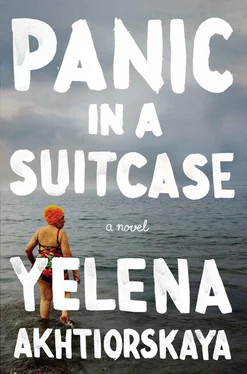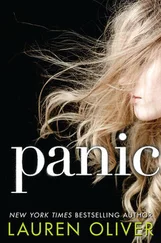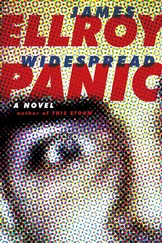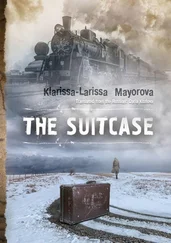Yeah, said Frida. Then shook her head, No. They wear lots of different kinds, she said, an infinite variety. No such thing as a typical top. That’s why America’s known as a free country. She wasn’t sure why she was taking this tone or whether she was being sarcastic.
And you have Baby Einstein, said the wife.
Yep, said Frida, hoping to leave it at that and not stir the insanity brewing underneath.
Here they’d never think up anything like that, said the wife. And it shows, you know, upon the quality of our youth. Savages! Little liars, hooligans, and thieves! Whenever Volky or I hear that somebody’s visiting from abroad, we don’t ask for denim jackets or air conditioners or even fancy phones, we ask only for Baby Einstein. The wife paused and gave a stare of significance. When we heard you were coming, she resumed, we asked Pavel Robertovich to ask you to bring the Baby Einstein for us. They’re always coming up with something new, you know.
Frida’s eyes lifted in contemplation, as if she might suddenly remember about all the Baby Einstein products she’d hauled in from the States. The wife read Frida’s thoughts and narrowed her focus on the bloated suitcase in the center of the room (still packed, of course, just herniating a few garments). The moment of hope was allowed to take a breath.
I would’ve, but Pasha never mentioned anything.
The wife’s attention remained fixed on the suitcase. He never mentioned it? she repeated, absorbing her disappointment gradually, in doses.
Not a word, said Frida.
Well, Pavel Robertovich is a busy man. He has many important things to think about. And who are we to him?
Pasha’s a little absentminded, said Frida. There seems to be a consensus about that. If you want him to do something, you need to provide constant poking.
We reminded the both of them not once and not twice. Volky and I keep to ourselves, we don’t impose. But when it comes to Baby Einstein, we’re not shy. They really never said anything about it to you?
Frida shook her head, noting the regression, a bad sign. Of course, if I’d known, she said, I would’ve brought it for you. And next time—
So you don’t have it? said the wife.
No, said Frida.
The wife wasn’t devastated, another bad sign. She wasn’t devastated not because she was a rational adult who could handle such news but because it still didn’t register, or perhaps she didn’t believe it.
The door flew open, and a boy ran in, inflamed knees like grapefruits being lurched through the air, hands cupped tensely over something. He screeched — the sound came from his joints. Other boys followed, dashing after the first, screeching at their own particular frequencies, little Einsteins in training. The last one, chubby and asthmatic, probably with a rash somewhere, caught Frida’s foot and went flying, stumpy arms akimbo, past the sofa, slamming the entirety of his weight into one of the grandfather clocks. The compound wail of the boy and the clock set something off in Frida. She was gone.
• • •
AFTER SHE’D LEFT the courtyard behind, there was a lapse of several blocks. She hurried blindly, inserting distance between herself and the apartment, the icons and clocks, Volky and his wife on their precious city vacation as they kept referring to it, with no intention to seize the day and take advantage of the actual city. Was Frida one to talk? She had yet to stray from the half-mile radius of Pasha’s initial tour. She kept to the same side of the street, used the same crosswalks, passed between the same two paint-chipped colonnades, all the while noticing helplessly the rigidity with which she navigated.
The people on the benches in Sobornaya Square were ancient. It was hard to imagine them ever going home, and it didn’t help that the city had a fondness for the sitting statue. Leonid Utesov was sunning himself beside an old lady not at all averse to a distinguished bronze arm around her papery shoulders.
Crossing Preobrazhenskaya at the frenzied intersection where public minibuses convened in a chaotic grid-central huddle, Frida was blasted by their ferocious heat. She continued, coughing, along the gated perimeter of City Garden. Go inside, an inner voice instructed. Enjoy your life — explore! But the tangle of shrubbery was too thick, the trees screened out too much daylight. Hadn’t she been warned about this park? Under no circumstances go in the vicinity of City Garden! It’s the scene of gruesome murders and frequent robberies, and let’s not get started on the rapes. Or had that warning been tacked onto Park Shevchenko? One of them was a beautiful park, ideal for a stroll on a warm summer day such as this, and the other was where practically every Ukrainian female had been robbed at gunpoint, molested, viciously raped.
Sabaneev Bridge was also called Mother-in-Law Bridge. Prince Vorontsov had it erected after building his mother-in-law a house across a now-nonexistent river from his palace, a bridge that in the past few decades had acquired the tradition of newlywed lock-hanging. Sveta’s chirp, Pasha’s rabbinic profile. Were they having fun in Tbilisi? Were they at least a little bit worried, racked by guilt, having left Frida to fend for herself in a foreign city?
Two guards stared her away from a synagogue freshly painted or long untouched. Walking away was like cutting short an encounter with a prissy friend, an only child who’d been pampered from a young age, but probably for good reason. Cobblestones carved breath. Past the cream-puff-pastry Opera House and the gardened-off Literary Museum, down the quaint urine-dribbled steps to a narrow street at the tapered end of which was a cliff.
Nearby, construction workers were taking a lunch break. She yearned to feel disgusted at their ogling, if only they weren’t so engrossed in their sandwiches. She went up to them and asked a question. A gaunt boy gave no-nonsense directions while twisting the cap off a two-liter plastic bottle of beer. A couple of empty bottles lay at his feet, still frothy around the edges. His eyes were eerily striking, like toxic sunsets over polluted waters.
• • •
SHE FAILED TO NOTICE the proper things. Was everything smaller than she remembered — or was it supposed to be larger? Less daunting and serpentine or only more so? By the time she remembered the duty to make such observations, the window for them had closed — size was no longer relative or meaningful but an inarguable fact to be accepted at face value. The skyline was in disarray, everything in halted construction. An engine revved, releasing the smell of shashlik. The rusted gate wore a shaggy coat of ivy. Frida got down on all fours on the narrow dirt path and pressed her cheek to the ground, trying to get a peek through the crevice under the gate. There was no sign of life from within. As she was spitting out dirt, the ridiculousness of the enterprise dawned on her. It was as if she were taking orders from some behind-the-scenes charlatan who regularly guided foolish young people through these kinds of missions, from which they left empty-handed and only more spiritually bereft than before but convinced that their arduous floundering and grasping meant that something had been accomplished too great for their own comprehending. Frida collapsed and curled up in a ball. Think, she implored herself. Make a plan! But she was tired, tired in a new way. There was no end to discovering the subtleties of exhaustion. Or did they all fall under the rubric of self-pity? Relief came in the form of some shade. The sun had been taking a vicious afternoon angle.
The shade had voice — deep, resonant, husky. Get away from my dacha, it said. Find someone else’s gate to sleep on! That’s right, young lady. Shoo!
Frida looked up and was instantly recognized. It was a much-needed affirmation. Not only was she recognized, her presence induced an uplift of mood, a heightening of tonus, a surge of joy — it was treated as a stupendous surprise. The bloated yet mousy, yellowish gray woman overhead gasped and cried, Frida, it’s you! I don’t believe it! My God, let me get a look at you! and a succession of many more delicious exclamatory platitudes that occasionally were the only satisfactory response. The bloated lady was Nadia, but by the time that thunderbolt struck, Frida was already experiencing great surges in return, overcome by the desire to burrow her nose into the dark, glistening pocket of Nadia’s neck.
Читать дальше












